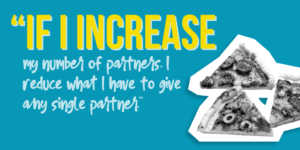In one of the local discords I’m in, someone posted a link to an article on PolyLand about what makes for a polyamorous relationship that thrives.
A lot of what this article says, I disagree with.
Not in practice, because I really can’t disagree with what works for others, of course. But in interpretation. What the author took from what they saw.
But I’ll come back to those in other writings, LOL.
Today, I want to talk about one thing and one thing only: The behavior modification outlined in the article.
It’s simple and it’s brilliant:
- Reward what you want in your life.
- Ignore or do not reward what you don’t want in your life.
Here are a few quotes:
“And if and when someone did reciprocate, I rewarded the hell out of that graciousness.”
“And I began to never reward ungracious or selfish behavior that I’d rather not see again.”
“Interaction by interaction, I rewarded gracious behavior and didn’t reward ungracious behavior. And it changed everything.”
While I might quibble over what is gracious and ungracious behavior, or selfish or whatever, I do not quibble with the method outlined here.
At all.
In fact, I highly recommend it.
Here’s another part, though, and if you think that bit above is tough (it really is, when you’re not used to it), this next part, which actually has to happen at the same time, or sometimes even before is even HARDER:
“When I began to model graciousness, they began to do it as well. To follow suit.”
“Acting in a more gracious way when I didn’t get what I wanted meant I had work on myself a lot. I had to become more emotionally secure and learn to deal with any jealousy I felt in a productive way.”
“And it wasn’t always easy to keep from caving to people who were behaving ungraciously. I had to learn the emotional equivalent of closing my mouth and sitting on my hands. And just letting them do their thing, thrashing, kicking up a fuss.”
I like to point out that to practice behavior modification on others (or dogs, for example), first you have to modify your own behavior.
And Page Turner demonstrates exactly this with those quotes.
Those of you who follow my writings/musings: What do you think this sounds a lot like?
.
.
.
Anyone?
.
.
.
Bueller?
.
.
.
Bueller?
.
.
.
Yep. You got it. Boundaries.
Setting boundaries. Communicating boundaries. Modeling boundaries. And rewarding people in your life who set, communicate, and model boundaries themselves.
Behavior modification based on personal boundaries.
It’s so simple.
Because once you start modeling personal boundaries, people in your life will sort themselves out into four piles:
Pile 1 People: Will see your boundaries and vamoose. They don’t want you to have boundaries. That ruins their fun.
Pile 2 People: Will recognize your boundaries and try to change them. These people want to regain control or feelings of compatibility more than they want you to be happy or live the life that you want.
Pile 3 People: Will see your boundaries, and may take a while to really “get” them, but will start mimicking your behavior with their own boundaries, as well as honoring yours.
Pile 4 People: Will see your boundaries and LOVE them, because they have strong boundaries themselves and know that you will be better for them. They will celebrate your boundaries and the fact that you have set them, and encourage more. They may have inspired you to set boundaries to begin with.
In addition, people who have good boundaries and encourage them in others will be attracted to you. Those who don’t want other people people to have good boundaries will be repelled.
And those who don’t want what you want in life will also be repelled.
Let’s go back to those two easy steps:
- Reward what you want in your life.
- Ignore or do not reward what you don’t want in your life.
Can you see what step is noticeably missing?
There is no step for trying to convince another person to do what you want.
There is no cajoling. There is no begging. No manipulation. No convincing.
There is rewarding what you want in your life. There is not rewarding (or ignoring) what you do not want.
It’s that simple.
And again, not easy.
Because MOST people don’t really understand that we are all as humans better off choosing people who choose us, and instead we choose people we want, then try to change them.
But it’s a habit that has been modeled and rewarded our whole lives (yes, more behavior modification), so we’ve learned to practice it ourselves.
And these two simple steps?
- Reward what you want in your life.
- Ignore or do not reward what you don’t want in your life.
Well, those have probably not been modeled well at all for most of us. And we may not really even know what we want (and don’t want), which makes it much harder.
But as Page Turner said in that article, it works when you put in the effort to do it right.
It is the MOST BASIC of behavior modification.
The place to begin.
It’s also 100% ethical to practice even without consent in any relationship because it really only pertains to YOUR life and what you will or will not accept or respond to, rather than to changing others.
And this ONE skill, this one habit, can improve your life a thousand-fold.
And what could be more simple than rewarding what you really want in your life? And just not putting ANY energy at all into what you don’t?
What are your thoughts?
First question: Do you really know what you want out of life? Do you have a solid clue? Do you feel like you have the foundation to base something like this on?
Because that is actually pretty key. I’ll write more on this in a follow-up article.
Do you reward the behaviors you want in your life?
And just as importantly (perhaps even more importantly, in the long run), do you ignore and/or resist rewarding the behaviors you do not want?
Why or why not?








